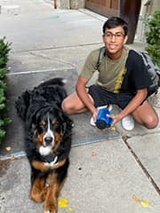Attention Deficit-Hyperactivity Disorder: Rohan’s Story
Attention Deficit-Hyperactivity Disorder: Rohan’s Story
Rohan, 13, isn’t sure what path he wants to take in the future — athlete, engineer, architect, analytics or maybe some creative pursuit — but what he does know is that he’ll be successful because of the guidance he’s received from Jenelle Nissley-Tsiopinis, PhD, a psychologist in Center for the Management of ADHD at Children’s Hospital of Philadelphia.

“I know I’m capable of going to college and succeeding,” says Rohan, a high school freshman. “With what Dr. Nissley has taught me, I can do it.”
Rohan was diagnosed with attention deficit-hyperactivity disorder (ADHD) when he was in kindergarten. His IQ was high, but he had trouble paying attention, finishing tasks and following directions.
“Then we found Dr. Nissley,” says Rohan’s mother, Farah. “She’s been wonderful, teaching him coping strategies and learning strategies. He’s thriving today.”
Farah admits that when she first learned Rohan had ADHD, she was taken aback. What would it mean for his future? Would he always struggle, she wondered?
“I was disillusioned when we got the diagnosis,” Farah says. “Then, as he worked with Dr. Nissley, I saw flickers that kept getting brighter and brighter. The transformation has been quite remarkable.”
Rohan also sees Emily K. Shabason, MD, in CHOP’s Division of Developmental and Behavioral Pediatrics, who has worked with the family to find the right medication for Rohan during his various stages of growth. “Going into adolescence he’s having another spurt so that means another change,” Farah says, “and I’m confident Dr. Shabason will help us figure it out.”
From disorganized to having a plan

Many children — and even adults — who have ADHD have trouble with executive function, which is the ability to organize thoughts and tasks, manage time, and make decisions. Instead, they get overwhelmed, miss deadlines (or even that there was an assignment) and seem scattered.
Much of Dr. Nissley’s guidance was to help Rohan find practical, workable ways to stay organized so he could meet his goals for school and have time for fun, too.
“In eighth grade I was stressed out over homework,” Rohan remembers. “She taught me how to break things down and how to organize it. Now I keep track of how long it takes me to do certain types of homework assignments so I can make enough time to get it done, along with other things I like to do. Because I plan, I don’t have to rush and get all stressed.”
He starts every day by checking a white board in his room, where he has written down everything he needs to do that day. And, with a deeper understanding that lack of sleep makes his ADHD more challenging to manage, he aims to wind down and go to sleep at 10:30 p.m. each night, “so I have enough energy for the next day,” he says.
An accordion binder is his mainstay to staying organized at school, which is especially important since his high school, Science Leadership Academy, uses a project-based approach to teach all subjects. It would be impossible to stay up to date with all the long-term projects without his binder and the organizational skills to use it.
His own best advocate
To Farah, another huge lesson Rohan has learned from Dr. Nissley is to speak up for himself and ask for what he needs.
Sometimes, it’s to seek an accommodation at school or get clarification on an assignment; other times, it’s when he feels a need to touch base with Dr. Nissley.
“He’ll tell me, ‘I want to work with Dr. Nissley,’ so I’ll make an appointment,” Farah says. “At school, he’ll advocate for more time. He has the confidence to do that now. It’s exactly what we wanted.”
Dr. Nissley is helping him plan out his preparation for taking the SAT next year. “There’s always something to work on for the future and college,” Rohan says. “I practice the skills she’s taught me. I feel I’m in a great place.”
Time for fun, friends and tennis

With his ADHD managed, Rohan has time to relax with his friends, watch sports, romp with his dog, Harry, and play tennis. Because he had severe strabismus in both eyes as a little kid, requiring two surgeries, his eye-hand coordination used to be “really, really bad.” But now he devotes six to eight hours a week to playing tennis and is looking forward to an intensive three weeks of practice and tournaments in Florida when school is out, with the goal of earning a U.S. Tennis Association (USTA) juniors ranking.
The Center for ADHD has helped him — and his parents — keep everything on track.
“The ADHD Center is like a village to help your child and family,” Farah says. “They give you the support and information — and homework for parents, so we could reinforce the tools he was learning. I’ve had to learn and accept that our child learns differently. You need a positive outlook. CHOP had the slogan: Hope lives here. I found hope and confidence that I was doing the right thing. I found my people and the tools I needed. I’m so grateful.”
In summer 2022, the Center for the Management of ADHD will be moving to 4601 Market St., along with other outpatient services in the Department of Child and Adolescent Psychiatry and Behavioral Sciences, to newly renovated space in the Provident Building.
Rohan has advice for other kids with ADHD:
“Don’t worry. It’s not the end of the world; you just learn differently,” he says. “If there’s something you’re passionate about, don’t let ADHD stop you. Always be an advocate for yourself and get the help you need.”